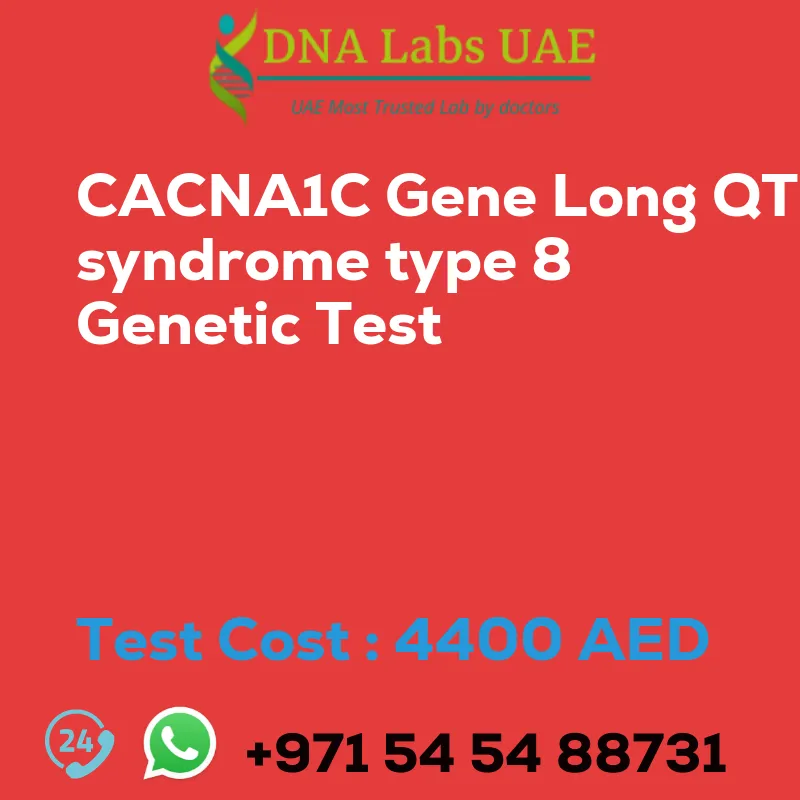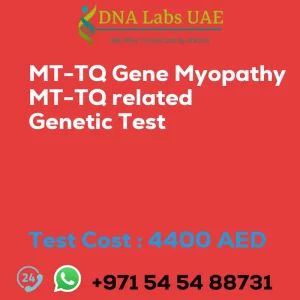CACNA1C Gene Long QT syndrome type 8 Genetic Test
At DNA Labs UAE, we offer the CACNA1C Gene Long QT syndrome type 8 Genetic Test. This test is designed to detect mutations in the CACNA1C gene that are associated with Long QT syndrome type 8. The test is performed using NGS (Next-Generation Sequencing) technology, which allows for the simultaneous analysis of multiple genes.
Test Components and Price
The CACNA1C Gene Long QT syndrome type 8 Genetic Test costs AED 4400.0. The test requires a blood sample or extracted DNA, or one drop of blood on an FTA card.
Report Delivery and Method
After the sample is collected, the report will be delivered within 3 to 4 weeks. The test is performed using NGS technology.
Test Type and Doctor
The CACNA1C Gene Long QT syndrome type 8 Genetic Test falls under the category of Cardiovascular Pneumology Disorders. The test is conducted by a cardiologist in our Genetics department.
Pre Test Information
Prior to the test, it is important to provide the clinical history of the patient who is undergoing the CACNA1C Gene Long QT syndrome type 8 NGS Genetic DNA Test. Additionally, a genetic counseling session will be conducted to create a pedigree chart of family members affected by the CACNA1C Gene Long QT syndrome type 8 NGS Genetic DNA Test gene CACNA1C.
Test Details
The CACNA1C gene is responsible for encoding the alpha-1C subunit of the L-type voltage-gated calcium channel. Mutations in this gene have been linked to various conditions, including Long QT syndrome type 8. Long QT syndrome is a heart rhythm disorder characterized by a prolonged QT interval on an electrocardiogram (ECG). This can lead to life-threatening arrhythmias such as torsades de pointes or ventricular fibrillation.
NGS genetic testing allows for the analysis of the DNA sequence of the CACNA1C gene. By identifying mutations or variations in this gene, the test can provide valuable information about an individual’s risk of developing Long QT syndrome type 8. This information can be used for diagnostic purposes, genetic counseling, and guiding treatment decisions.
It is important to note that NGS genetic testing is a complex process that requires specialized equipment and expertise. It is typically performed in a laboratory setting by trained professionals. If you suspect that you or someone you know may have Long QT syndrome type 8, it is recommended to consult with a healthcare professional or a genetic counselor who can guide you through the process of genetic testing and interpretation of the results.
| Test Name | CACNA1C Gene Long QT syndrome type 8 Genetic Test |
|---|---|
| Components | |
| Price | 4400.0 AED |
| Sample Condition | Blood or Extracted DNA or One drop Blood on FTA Card |
| Report Delivery | 3 to 4 Weeks |
| Method | NGS Technology |
| Test type | Cardiovascular Pneumology Disorders |
| Doctor | Cardiologist |
| Test Department: | Genetics |
| Pre Test Information | Clinical History of Patient who is going for CACNA1C Gene Long QT syndrome type 8 NGS Genetic DNA Test. A Genetic Counselling session to draw a pedigree chart of family members affected with CACNA1C Gene Long QT syndrome type 8 NGS Genetic DNA Test gene CACNA1C |
| Test Details |
The CACNA1C gene is responsible for encoding a protein called the alpha-1C subunit of the L-type voltage-gated calcium channel. Mutations in this gene have been associated with various conditions, including Long QT syndrome type 8. Long QT syndrome (LQTS) is a heart rhythm disorder characterized by a prolonged QT interval on an electrocardiogram (ECG). This prolonged QT interval can lead to potentially life-threatening arrhythmias, such as torsades de pointes or ventricular fibrillation. NGS (Next-Generation Sequencing) genetic testing refers to a high-throughput DNA sequencing technology that allows for the simultaneous analysis of multiple genes. In the context of Long QT syndrome type 8, NGS genetic testing can be used to identify mutations or variations in the CACNA1C gene that may be contributing to the development of the condition. By analyzing the DNA sequence of the CACNA1C gene, NGS genetic testing can provide valuable information about an individual’s risk of developing Long QT syndrome type 8. This information can be used for diagnostic purposes, genetic counseling, and potentially guiding treatment decisions. It’s important to note that NGS genetic testing is a complex process that requires specialized equipment and expertise. It is typically performed in a laboratory setting by trained professionals. If you suspect that you or someone you know may have Long QT syndrome type 8, it is recommended to consult with a healthcare professional or a genetic counselor who can guide you through the process of genetic testing and interpretation of the results. |








